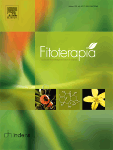Protective effect of rutin on paracetamol- and CCl4-induced hepatotoxicity in rodents
Abstract
Rutin, a well-known flavonoid was investigated for its possible protective effect against paracetamol- and CCl4-induced hepatic damage. Paracetamol produced 100% mortality at the dose of 1 g/kg in mice while pre-treatment of animals with rutin (20 mg/kg) reduced the death rate to 40%. Oral administration of a sub-lethal dose of paracetamol (640 mg/kg) produced liver damage in rats as manifested by the rise in serum level of transaminases (AST and ALT). Pre-treatment of rats with rutin (20 mg/kg) prevented the paracetamol-induced rise in serum enzymes. The hepatotoxic dose of CCl4 (1.5 ml/kg; orally) also raised the serum AST and ALT levels. The same dose of rutin (20 mg/kg) was able to prevent the CCl4-induced rise in serum enzymes. Rutin also prevented the CCl4-induced prolongation in pentobarbital sleeping time confirming its hepatoprotectivity. These results indicate that rutin possesses hepatoprotective activity and the presence of this compound in Artemisia scoparia may explain the folkloric use of the plant in liver damage.

